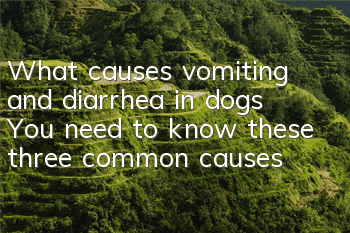Common causes of vomiting and diarrhea in dogs: Improper diet
If a dog does not eat but still vomits and has diarrhea, it may be because he has eaten something wrong. The owner can see if he has fed some spoiled cans, milk cakes, milk, chocolate, human food, or if the dog has eaten dirty things outside. It is best not to eat milk products for dogs, as they are prone to lactose intolerance, which can lead to diarrhea. Chocolate, human food, etc. must not be given to dogs as they are very harmful to the dog’s health.
Common causes of vomiting and diarrhea in dogs: indigestion
Dogs have weak gastrointestinal function and lack of digestive enzymes, making it more difficult for dogs to digest and absorb food, so it can lead to The dog has vomiting and diarrhea. If the owner does not feed the dog regularly, or often feeds the dog irritating food, the dog's gastrointestinal tract will be difficult to bear such a load, and the gastrointestinal tract will not be able to adapt. Therefore, owners should adjust the time and frequency of feeding their dogs. It is best to eat small meals frequently so that the dog's stomach and intestines can have a regular diet. Probiotics can also be added to the dog's food to promote the dog's digestion and absorption.
Common causes of vomiting and diarrhea in dogs: Parasites
Dogs have vomiting and diarrhea, and their stools are jelly-like and blood-streaked. The dogs begin to lose weight, lose their appetite, and can even be found in their stools. The presence of worms indicates that the dog may have parasites in its belly. At this time, the owner needs to deworm the dog, and feed the dog Bayer or Baichongqing according to the dosage instructions. In addition, dogs should be dewormed regularly. It is recommended that puppies before six months of age should be dewormed once a month, and adult dogs after six months of age should be dewormed once every three months.








